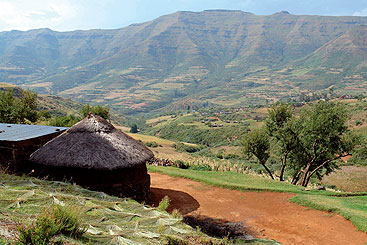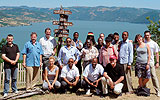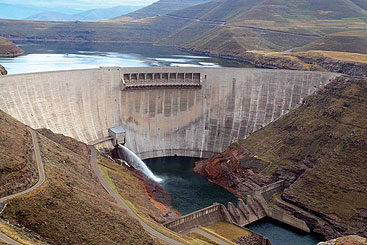
Partnerships beyond the basin
The ICPDR is forging alliances around the world to share experiences on integrated river basin management and to develop innovative and collaborative solutions to water quality and quantity pressures with other international river basins.

The Orange-Senqu River Basin is shared by four countries: Botswana, Lesotho, Namibia and South Africa.
The work of the ICPDR depends on cooperation. As the most international river basin in the world, the ICPDR brings together representatives of 1 countries and the European Commission to make decisions that affect the 8 million people living in the basin. But the ICPDR looks beyond the basin for inspiration and ideas, and working with other river basins provides an opportunity to learn from similar challenges and experiences to see the Danube through other perspectives.
Cooperation between The Orange-Senqu River Commission (ORASECOM) and the ICPDR began last year at the impetus of the German Agency for Technical Cooperation (GTZ), which is the lead International Cooperating Partner working with water in the Southern African region. A delegation from ORASECOM, as well as from the Permanent Okavango River Basin Water Commission, spent a week in the Danube Basin in July 2008 for a study tour, with stops in Hungary and Serbia and the ICPDR Secretariat to share experiences on transboundary basin management.
The ICPDR and ORASECOM discussed topics related
to institutional capacity and agreed to establish a longterm
relationship of cooperation.
The oRaNge-seNqu RIVeR coMMIssIoN
The Orange-Senqu River Commission (ORASECOM) promotes the equitable and sustainable development of the resources of the Orange-Senqu River. ORASECOM provides a forum for consultation and coordination between the riparian states to promote integrated water resources management and development with the basin. The highest body of ORASECOM is the Council, which is supported by various Task Teams to manage projects, and a Secretariat, based in Pretoria, South Africa.
The Orange-Senqu River Basin extends over four countries: Botswana, Lesotho, Namibia and South Africa, covering an area of 985,000 km². Almost 59% of the basin falls within South Africa, 26% in Namibia, 12 % in Botswana and 3% in Lesotho. The two main tributaries are the Senqu and the Vaal Rivers
Valuable differences. At first glance, the two basins may not seem to have much in common, but in fact they share many traits. Both river basins face shared pressures, like eutrophication, and similar challenges, like managing transboundary resources. But it is the differences between the two commissions that make cooperation so valuable. The climate of the Orange-Senqu River Basin varies significantly from the temperate Lesotho Mountains, through dry grasslands and savannahs to the arid semi-desert Nama and Succulent Karoo regions. “The issue of climate change is one that they are dealing with now in southern Africa, and there is so much we can learn from those experiences,” says Philip Weller, ICPDR Executive Secretary.

Allocation of water, too, is an important issue for ORASECOM, and one that the countries are addressing successfully. “This part of the world has really managed to turn shared water practices into a vehicle for peaceful cooperation and integration,” says Horst Michael Vogel, Programme Leader for GTZ Transboundary Water Management in the Southern Africa Development Community. “All the countries in the region have realised that water is such a strategically important resource for everyone and that everyone has to get along.”
Sharing solutions. A second visit this July brought an ORASECOM delegation to the Danube Basin to discuss transboundary monitoring and river basin management. Several field trips were included as part of the visit: the group travelled to the Austrian Federal Ministry of Agriculture, Forestry, Environment and Water Management to discuss monitoring, and visited the monitoring station at Hainburg. They also went to the Slovak Hydrometeorlogical Institute, so they had a chance to see activities in two Contracting Parties. The ICPDR has a lot of experience in joint water quality monitoring networks, which ORASECOM is eager to establish in their own basin.
The ICPDR’s experience in public participation could also help ORASECOM establish effective regional instruments in southern Africa. The success of the Danube Box has inspired ORASECOM to create a similar educational tool adapted to local conditions, and they are hoping to strike a business partnership with South African petrochemical giant SASOL.
A lasting partnership. The two commissions have agreed to an initial three-year period of cooperation. Fritz Holzwarth, Head of the German Delegation to the ICPDR, visited an ORASECOM Meeting in April. A Memorandum of Understanding has been proposed, and more visits are planned. A delegation from ORASECOM will attend the 12th Ordinary Meeting of the ICPDR in December.
“We view cooperation with the ICPDR as an opportunity to learn from their many years of experience and practice in water resource management on the Danube Basin,” says Lenka Thamae, Executive Secretary of ORASECOM.

The ICPDR hosted two Southern Africa basin commissions, ORASECOM and OKACOM, on study visits to the Danube River. Below, the Katse Dam, part of the Lesotho Highlands Water Project, provides revenue to Lesotho by transferring water from the catchment of the Orange-Senqu River in Lesotho to meet the growing demand for water in the major industrial and population centres in South Africa.
Disclaimer
The information contained in the ICPDR website is intended to enhance public access to information about the ICPDR and the Danube River. The information is correct to the best of the knowledge of the ICPDR Secretariat. If errors are brought to our attention we will try to correct them.
The ICPDR, expert group members, nor other parties involved in preparation of information contained on this website cannot, however, be held responsible for the correctness and validity of the data and information provided, nor accept responsibility or liability for damages or losses arising directly or indirectly from the use of the information conveyed therein.
Only those documents clearly marked ICPDR documents reflect the position of the ICPDR.
Any links to other websites are provided for your convenience only. The ICPDR does not accept any responsibility for the accuracy, availability, or appropriateness to the user's purposes, of any information or services on any other website.
When using the information and material provided on this website, credit should be given to the ICPDR.
